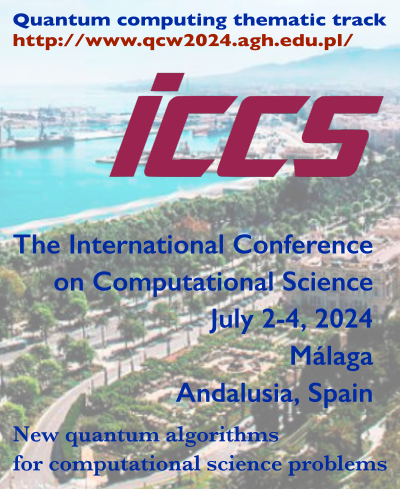
Quantum computing is a widely developing paradigm that exploits the fundamental principles of quantum mechanics to solve problems in various fields of science that are beyond the possibilities of classical computing infrastructures. Despite the increasing activity in both theoretical research and hardware implementations, reaching the state of useful quantum supremacy is still an open question. This workshop aims to provide a forum for computational scientists, software developers, computer scientists, physicists and quantum hardware providers to understand and discuss research on current problems in quantum informatics. The special focus of this year's workshop is the application of quantum algorithms to computational science problems. We cordially invite you to submit a paper presenting the results of original research in the area of quantum computing.
Specific topics include:
- Application of quantum computing to current problems in computational science;
- New quantum computing algorithms;
- New hybrid quantum-classical solutions;
- Quantum algorithms in machine learning and big data in computational science;
- Integration of quantum computation with supercomputing infrastructure;
- Quantum computing hardware;
- Quantum error correction;
- Advanced methods for quantum software engineering;
- Novel numerical methods supporting quantum information theory;
- Environments and frameworks for quantum computing;
- Quantum simulators;
- Cloud-based support for quantum computing;
- Dedicated services required for quantum computing;
- Novel approaches to quantum games;
- Quantum networks / quantum Internet;
- Quantum programming languages;
- Creative tools for quantum computation education: video games, interactive art;
- Challenging applications in industry and academia.
Publication
Papers of 12-15 pages, written in English and formatted according to the Springer LNCS templates, should be submitted electronically via EasyChair. Choose "Quantum Computing thematic track". You also have the option of submitting a short paper of 6-8 pages. Both Full and Short Papers use the same templates and are published in LNCS. Templates are available here. The LaTeX2e Proceedings Templates are also available in the scientific authoring platform Overleaf. Please also make sure to follow Springers authors guidelines. All papers will be peer-reviewed. After the conference, the best papers will be invited for a special issue of the Journal of Computational Science (Impact Factor: 3.3).
Important Dates
Full paper submission: February 2, 2024
Notification of acceptance: April 1, 2024
Camera-ready papers: April 19, 2024
'Workshop Chairs
Katarzyna Rycerz, Department of Computer Science and ACC Cyfronet AGH, Krakow, Poland
Marian Bubak, Sano Centre for Computational Medicine and ACC Cyfronet AGH, Krakow, Poland
Program Committee
- Piotr Biskupski, IBM Security, PL
- Nicholas Chancellor, EPSRC UKRI Innovation Fellow, Durham University, UK
- Jacek Długopolski, Department of Computer Science, AGH, Krakow, PL
- Kareem H. El-Safty, Technical University of Munich, DE and DevisionX, Cairo, EG
- Piotr Frąckiewicz, Pomeranian University, PL
- Piotr Gawron, Nicolaus Copernicus Astronomical Center, Polish Academy of Sciences, PL
- Adam Glos, Algorithmiq, FI and Institute of Theoretical and Applied Informatics, Polish Academy of Sciences, PL
- Bartomiej Gardas, Institute of Theoretical and Applied Informatics, Polish Academy of Sciences, PL
- Tobias Guggemos, Ludwig-Maximilians-Universität München, Institut für Informatik, DE
- Manish Gupta, Nicolaus Copernicus Astronomical Center, Polish Academy of Sciences, PL
- Maximilian Höb, Leibniz Supercomputing Centre (LRZ), DE
- Krzysztof Kurowski, Poznan Supercomputing and Networking Center, PL
- Marcin Kuta, Department of Computer Science, AGH, Krakow, PL
- Tomasz Michalak, University of Oxford, UK and University of Warsaw, PL
- Jarosław Miszczak, Institute of Theoretical and Applied Informatics, Polish Academy of Sciences, PL
- Peter Müller, IBM Zurich Research Laboratory, Zurich, CH
- Marcin Niemiec, Department of Telecommunication, AGH, Krakow, PL
- Lidia Ogiela, Department of Computer Science, AGH, Krakow, PL
- Łukasz Pawela, Institute of Theoretical and Applied Informatics, Polish Academy of Sciences, PL
- Frank Phillipson, TNO, The Hague, NL
- Marcin Płodzień, ICFO, Barcelona, ES
- Heike Riel, IBM Fellow, Department Head Science & Technology, IBM Research, Zurich, CH
- Adam Rycerz, Jagiellonian University, Kraków, PL
- Özlem Salehi, Algorithmiq, FI
- Ayşin Sancı, Altınay Robot Teknolojileri, TR
- Haozhen Situ, College of Mathematics and Informatics, South China Agricultural University, CN
- Oskar Slowik, Center for Theoretical Physics, Polish Academy of Sciences, PL
- Bogdan Staszewski, University College Dublin, IE
- Magdalena Stobińska, University of Warsaw, PL
- Tomasz Stopa, IBM Software Laboratory, Kraków, PL
- Paweł Topa, Department of Computer Science, AGH, Krakow, PL
- Abuzer Yakaryilmaz, QWorld Association, ES and University of Latvia, LV
- Sebastian Zając, SGH Warsaw School of Economics, Warsaw, PL
- Justyna Zawalska, Department of Computer Science and ACC Cyfronet AGH, Krakow, PL
- Zoltan Zimboras, Algorithmiq, FI and Hungarian Academy of Sciences and Budapest University of Technology and Economics, HU
- Karol Życzkowski, Jagiellonian University, Kraków, PL
